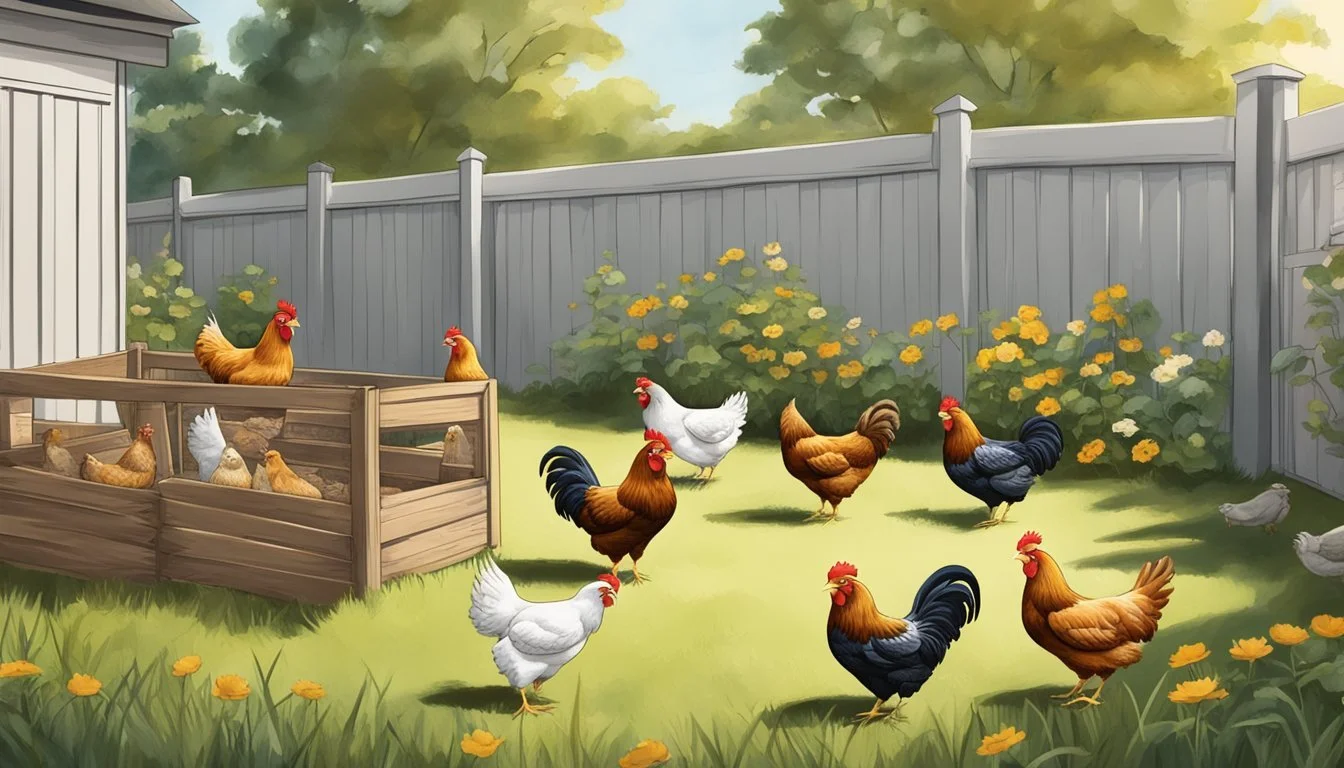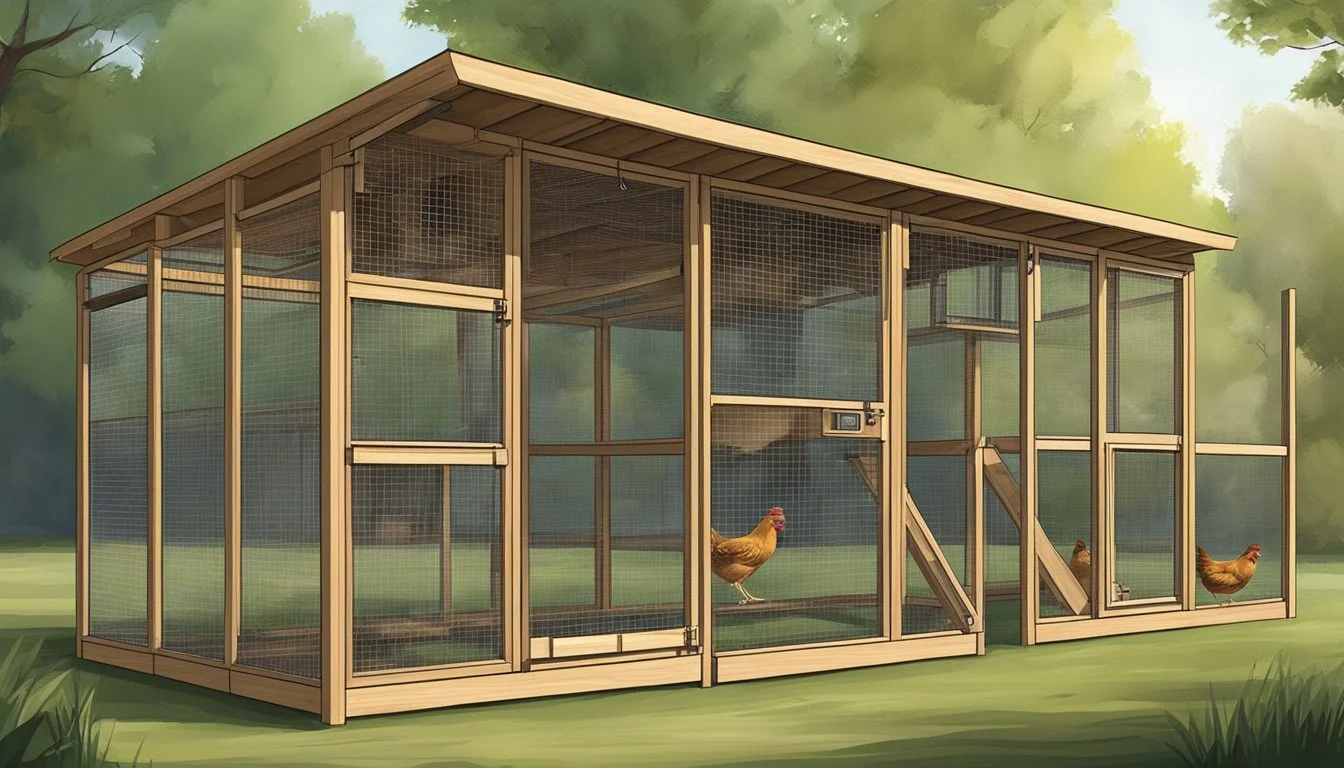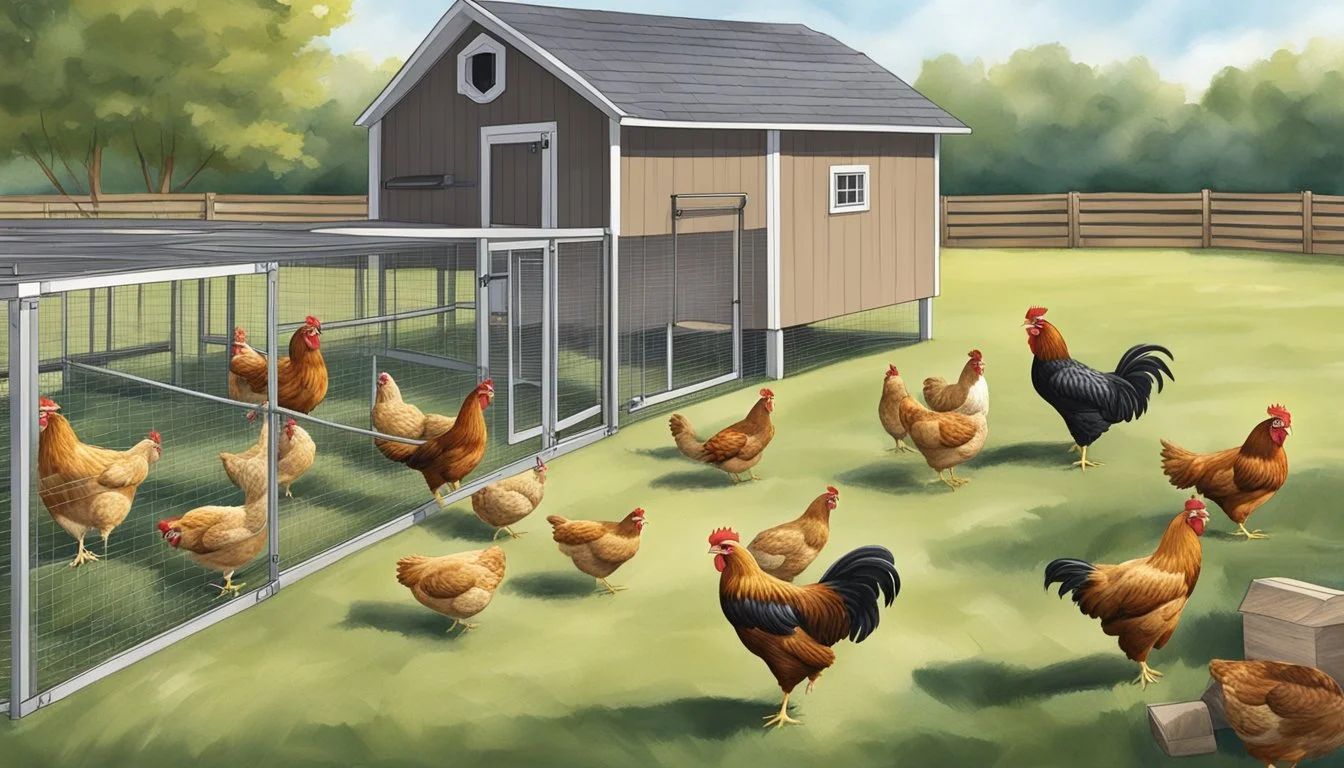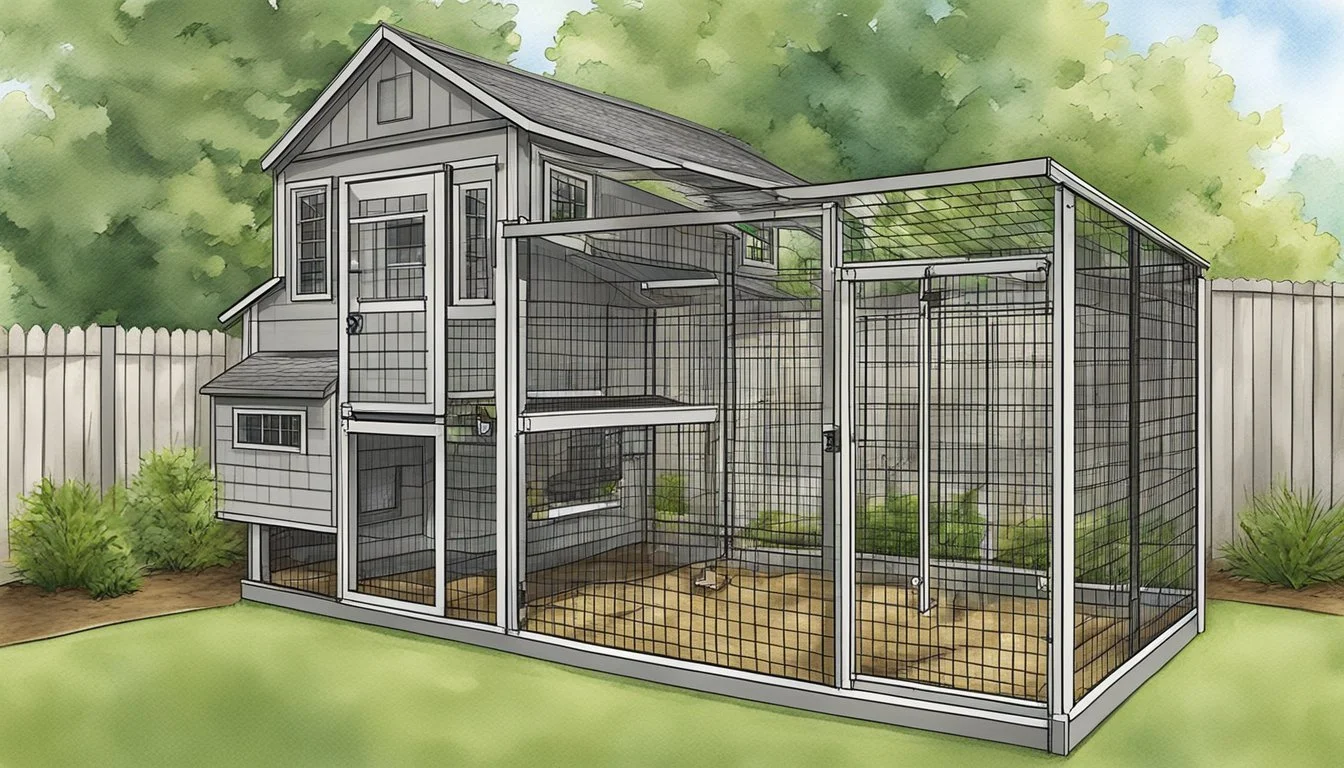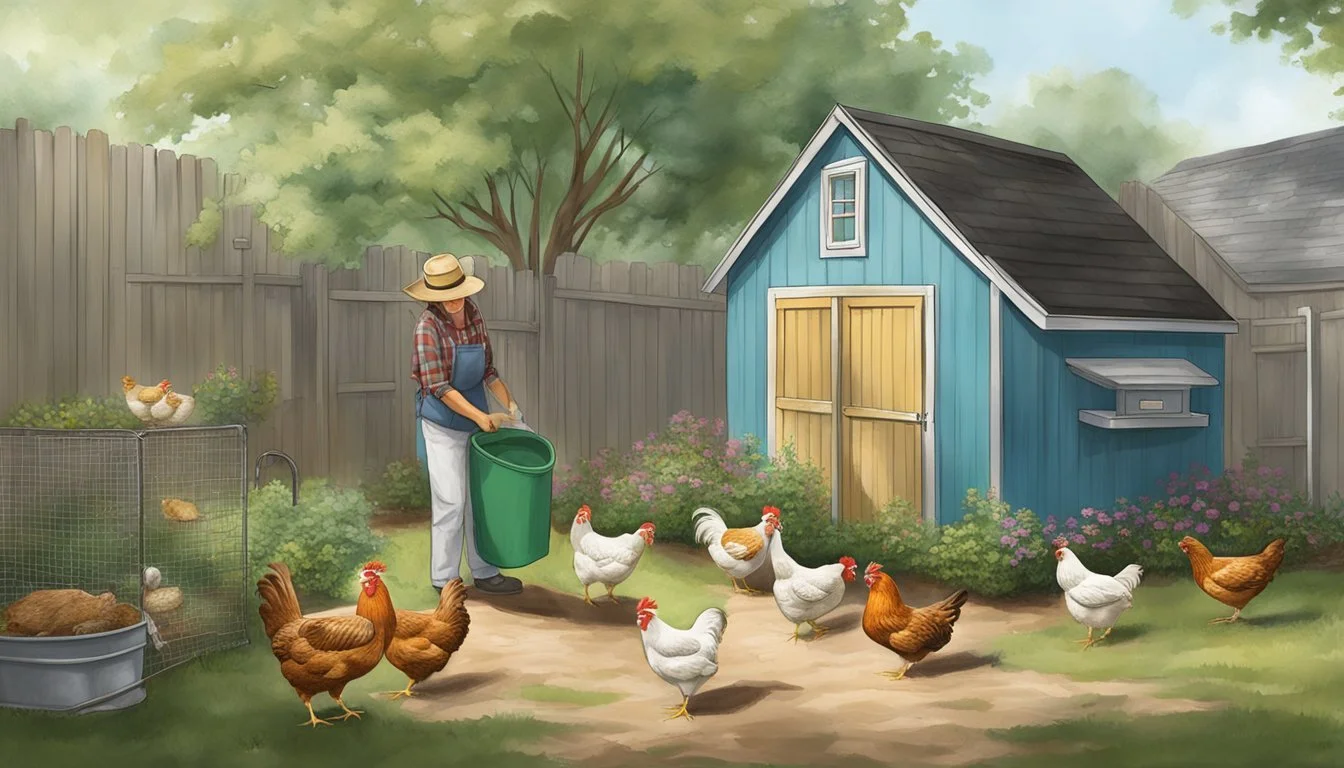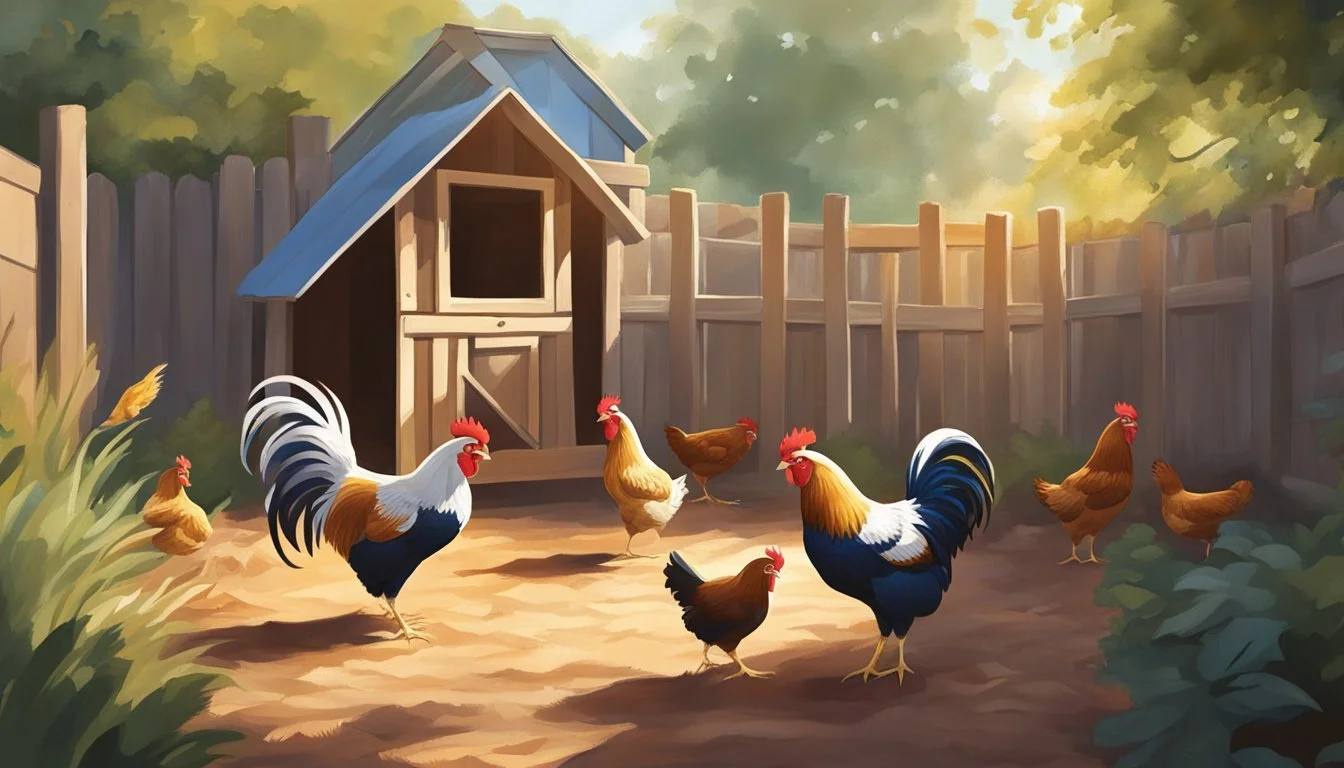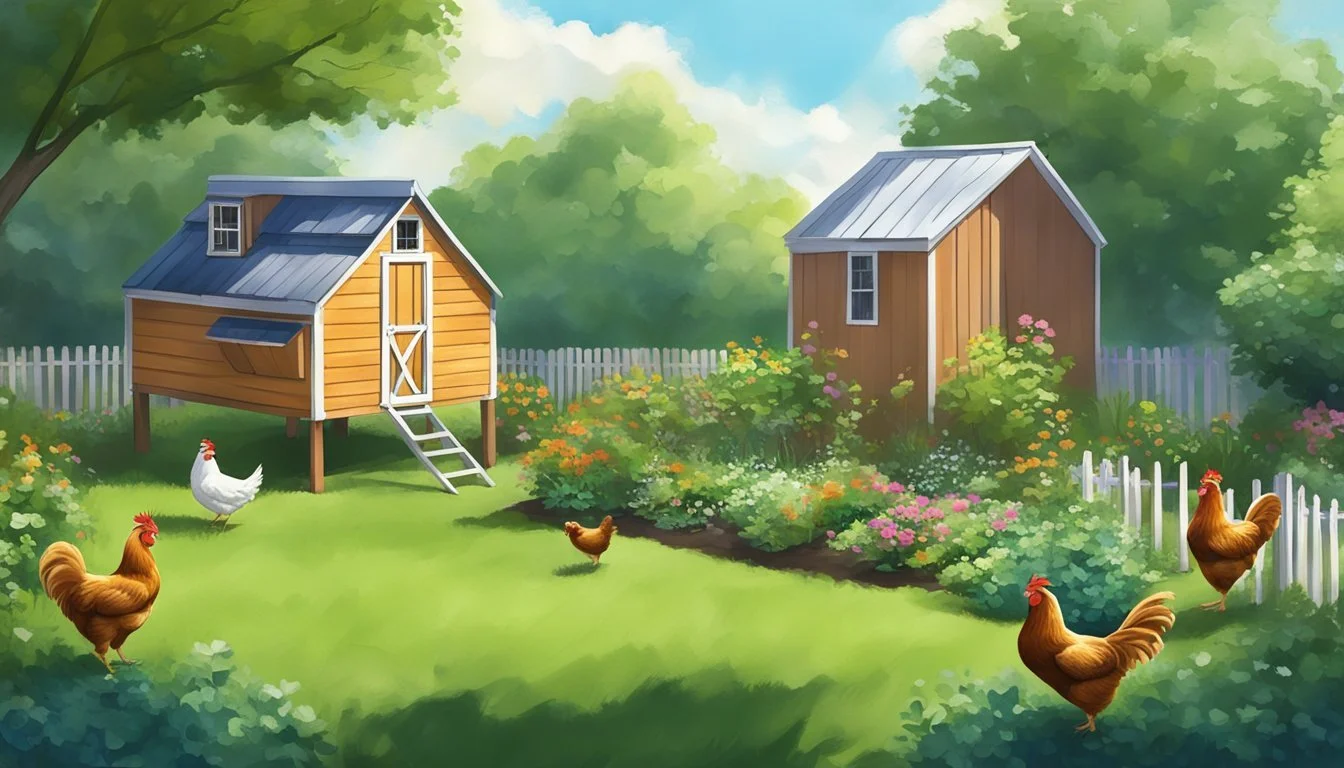Keeping Backyard Chickens in Charlotte, NC
A Guide to Urban Poultry Farming
In recent years, the trend of raising backyard chickens has taken root in Charlotte, North Carolina, appealing to those seeking a more sustainable and self-sufficient lifestyle. Charlotte residents are joining this movement, attracted by the benefits of fresh eggs, natural pest control, and the enjoyment that comes from caring for these animals. Before starting a backyard flock, it's imperative to understand the local regulations and requirements that govern chicken keeping in this urban setting.
Keeping chickens within Charlotte city limits requires adherence to specific municipal rules. Prospective chicken owners need to obtain permits to ensure compliance with the city's standards, which dictate the maximum number of chickens allowed and the conditions under which they can be kept. With a limit of 20 chickens per acre and mandatory permitting, the city balances the interests of urban poultry enthusiasts with considerations for neighborhood harmony and public health.
Education on the proper care of backyard chickens is essential for success in this endeavor. Residents must equip themselves with knowledge on constructing secure coops, providing adequate nutrition, and protecting their flocks from predators and diseases. When managed responsibly, backyard chickens can be a delightful addition to Charlotte homes, offering a touch of rural charm and a connection to the cycles of nature.
Understanding Local Chicken Ordinances
Keeping backyard chickens in Charlotte, NC requires understanding and compliance with the city’s specific ordinances to ensure a harmonious coexistence with neighbors and adherence to legal standards.
Zoning Regulations and Permits
In Charlotte, property owners must adhere to zoning regulations that allow the keeping of chickens when they obtain the appropriate permit. Zoning laws differ by area, and what's permissible in one neighborhood might not be in another. Therefore, it's crucial for residents to check with Charlotte's zoning policies before setting up a coop. They should apply for a permit as required by the city ordinances, ensuring their plans for keeping chickens are within the legal frameworks.
Nuisance and Noise Laws
The city of Charlotte maintains nuisance laws to mitigate potential disturbances caused by backyard chickens. Coops must be constructed and maintained in a manner that prevents odors and attractions for pests. While roosters are allowed, owners should be mindful of noise ordinances. Unnecessary noise could lead to complaints and potential legal challenges. Owners are responsible for keeping their chickens from becoming a nuisance to those around them.
Number and Gender Restrictions
There are specific limitations on the number and gender of chickens one can keep:
Maximum Chickens Allowed: 20 per acre
Roosters: Allowed
It's crucial for residents to know these restrictions to avoid penalties. The city ensures that these rules balance the interests of chicken enthusiasts with the well-being and comfort of the community at large.
Selecting Your Chickens
When starting a backyard flock in Charlotte, NC, one must consider the breed of chicken that suits their needs, understand egg production levels for different breeds, and learn how to raise chicks into productive laying hens.
Choosing the Right Breed
In Charlotte, the choice of breed will affect both the temperament of your chickens and their efficiency in egg production. For instance, Leghorns are known for their high egg yield, while Barred Rocks and Rhode Island Reds are favored for their hardiness and consistent laying patterns. If space allows, having no more than one chicken per acre ensures ample foraging opportunities and lower chances of overcrowding.
Popular Breeds Egg Production Temperament Leghorns High Active Barred Rocks Moderate to High Friendly Rhode Island Reds Moderate to High Hardy
Understanding Egg Production
Egg production varies widely among different chicken breeds. Heritage breeds generally lay fewer eggs than commercial hybrids but can provide greater nutritional value due to diverse diets. When selecting laying hens, consider that a single hen can lay anywhere from 150 to 300 eggs per year, with breeds like Leghorns on the higher end of this range.
Raising Chicks to Mature Hens
Purchasing chicks from a reputable hatchery ensures they have been bred for health and vitality. Raising young hens requires a carefully monitored environment to ensure they receive essential nutrients and develop into healthy, mature hens. As they grow, chicks will graduate from starter feeds to layer feeds, assisting in their progression into full egg-laying capacity around the 18-24 week mark.
Creating the Perfect Coop and Run
Proper coop design and secure run area play critical roles in the health and safety of backyard chickens in Charlotte, NC. They require careful consideration of location, materials, and layout to ensure a thriving environment.
Coop Design and Location
When constructing a chicken coop, the location is as important as the design itself. The ideal coop should be elevated to prevent issues with dampness and predators. It must be well-ventilated to keep the air fresh, but also insulated for temperature control. Proximity to the house can make for convenient access, but local regulations may require the coop to be at least 25 feet from any adjacent dwelling or property line. The size of the coop should be spacious enough to allow 2-3 square feet per chicken inside to provide ample space for movement.
Run Area and Security
The run area is where chickens spend most of their day. It should be enclosed with sturdy fencing material to keep predators out and chickens in. The top should also be covered with wire mesh or a solid roof to prevent escapes and protect from aerial predators. A minimum space of 8-10 square feet per chicken in the run area is recommended for adequate exercise. Surrounding the coop and run with secure hardware cloth buried at least 12 inches deep can deter digging predators.
Security Checklist:
Enclosed run area with sturdy fencing
Top covering to protect from predators
Buried hardware cloth to prevent digging
Nesting Boxes and Roosts
Nesting boxes should be accessible and cozy for hens to lay their eggs. One box for every three to four hens is typically sufficient. Place the boxes in a dark and quiet area of the coop to offer privacy and encourage egg-laying. Boxes should have soft bedding and be kept clean to ensure the hens' comfort and egg cleanliness.
Roosts need to be strong and stable, providing each chicken around 8-12 inches of perching space. The roosts should be positioned higher than the nesting boxes to satisfy the birds' instinct to roost off the ground at night, enhancing their sense of security. This positioning also helps keep nesting boxes free from droppings.
Daily Chicken Care and Management
Consistent care is essential in raising a healthy backyard flock in Charlotte, NC. Daily management includes proper feeding, watering, and coop maintenance to ensure the flock's well-being and productivity.
Feeding and Nutrition
Chickens require a balanced diet to maintain their health and produce fresh eggs. Feed your flock a high-quality commercial chicken feed that's appropriate for their life stage. Layer feed typically contains 16-18% protein and is enriched with calcium, which helps in producing strong eggshells. In addition to dry feed, chickens enjoy garden scraps and compost as a source of nutrients. However, it's important to avoid giving them moldy or spoiled food, as this can harm their health.
Daily Feeding Checklist:
Ensure continuous access to age-appropriate chicken feed.
Provide a variety of fresh food like vegetable peels and fruit scraps.
Monitor feed consumption to track the flock's health.
Watering Your Flock
Chickens must always have access to fresh water. Water is essential for digestion and egg production. Waterers should be cleaned regularly to prevent the buildup of algae and bacteria. In freezing temperatures, a heated water source or lamp may be necessary to keep the water from icing over.
Daily Watering Checklist:
Refill waterers with fresh, clean water.
Clean waterers to avoid contamination.
Check that water is not frozen during colder days.
Cleaning and Maintenance
A clean coop is crucial for preventing disease and keeping chickens comfortable. The coop should be cleaned daily to remove droppings and refresh bedding. Nesting boxes must be kept clean to ensure fresh eggs are not soiled. Perform regular inspections of the coop for potential predator access points and maintain the fencing in your garden to keep predators out.
Daily Cleaning Checklist:
Remove droppings and soiled bedding.
Check for eggs and remove them promptly to prevent breakage.
Maintain the coop's structural integrity to protect against predators.
Regular daily care for your backyard flock ensures healthy chickens, efficient egg production, and a rewarding experience in raising chickens.
Health and Safety
Ensuring the health and safety of backyard chickens involves implementing measures for disease prevention, protection against predators, and proper handling and storage of eggs.
Disease Prevention and Control
Preventing and controlling disease in a backyard flock begins with good hygiene and coop management. The Centers for Disease Control and Prevention (CDC) warns that chickens can carry Salmonella, a potential risk to human health. To mitigate this risk, coops should have good ventilation to keep the air fresh and reduce moisture, which can promote disease proliferation. Additionally, regular cleaning and disinfecting of surfaces, feeders, and drinkers are essential to prevent disease spread. It's also important to control rodents which can carry diseases into the coop.
Regular Practices:
Clean and disinfect the coop and equipment
Keep the coop dry and well-ventilated
Manage rodents and other pests
Protecting Against Predators
A secure coop is crucial for keeping chickens safe from predators such as dogs, raccoons, and hawks. The coop should be robust, with strong walls and a secure door that can be locked at night. Fences should be buried into the ground to deter digging predators. It is also advisable to use wire mesh over windows or open spaces to prevent smaller predators like snakes and rodents from entering.
Security Measures:
Ensure the coop is robust and lockable
Bury fences to prevent digging
Protect with wire mesh over openings
Egg Handling and Storage
Proper handling and storage of eggs are essential to reduce the risks of Salmonella contamination. Eggs should be collected frequently, ideally every day, and should be washed or wiped clean of any dirt or feces. After cleaning, eggs need to be stored at a consistent and cool temperature. The CDC recommends refrigerating eggs to maintain their quality and minimize health risks.
Egg Safety Protocol:
Collect and clean eggs daily
Refrigerate promptly to prevent bacterial growth
Engaging with the Community
Engaging with the community is a critical aspect of keeping backyard chickens. This involves clear communication with neighbors about the endeavor and sharing the benefits of raising chickens, such as surplus eggs.
Dealing with Neighbors
Maintaining good relationships with neighbors is vital when one decides to keep backyard chickens. The individual should inform and reassure neighbors about noise management and the steps being taken to prevent any nuisances. Communication is key. They should discuss coop placement, maintaining cleanliness to avoid odors, and noise mitigation strategies. Introducing neighbors to the chickens and educating them may also alleviate concerns. They might mention that routine inspection and oversight from animal control help ensure all local regulations are being met.
Scheduling a neighborhood meeting or providing a link to more information about backyard chickens can serve as an educational tool and foster community support. It's advisable to have a plan for potential noise complaints and ensure that the chicken shelter complies with city ordinances to avoid issues with neighbors and local officials.
Sharing Surplus and Experiences
Sharing can build a positive community atmosphere. Surplus eggs can be offered to neighbors or sold at local establishments like Renfrow Hardware. This not only distributes fresh produce but also fosters a sense of community and supports local commerce. Sharing experiences can also be beneficial. Hosting a small tour of the chicken area may provide fun and educational insights into urban farming. Additionally, this provides an opportunity to illustrate the care taken to maintain a clean, healthy environment for the chickens, further demonstrating the commitment to community well-being.
Legal Responsibilities and Compliance
In Charlotte, NC, residents keeping backyard chickens must navigate a framework of city and state regulations to ensure they are compliant with the law. Adherence to proper animal housing, acquiring necessary permits, and understanding the implications of ordinances are vital for a lawful backyard chicken habitat.
Animal Control and Inspections
Under the city's ordinances, animal control officers may inspect chicken coops to ensure they meet specific requirements. Key points include:
Coops and Enclosures: Must be secure, enclosed, and at least 25 feet from neighboring dwellings or property lines.
Maintenance: Coops should be well-ventilated, predator-resistant, and maintained to be clean and free of odors.
It is the homeowner's responsibility to facilitate inspections and address any issues animal control officers identify.
Understanding Fines and Penalties
Noncompliance with city or state laws governing backyard chickens can result in penalties. Violations of the ordinances, such as exceeding the allowed number of chickens or improper coop maintenance, might incur fines. Specifics include:
Chickens Allowed: Up to 20 chickens per acre, with no roosters permitted within city limits.
Penalties: Fines vary by the nature and severity of the violation.
Residents should review all relevant ordinances to avoid penalties and ensure they are responsible owners in accordance with city and state laws.
Additional Considerations for Backyard Chickens
In Charlotte, NC, keeping backyard chickens involves more than just fresh eggs. Owners must consider the financial commitment, the impact on their property, and the available resources for proper education on chicken care.
Costs and Budgeting
Keeping chickens requires an initial investment and ongoing expenses. Startup costs may include purchasing a coop, which should be secure and meet city regulations, and cost anywhere from $150 to over $1,000. Chickens also need feeders, waterers, and bedding, which can total $50 to $200. One should budget for ongoing costs such as feed, that averages $15 to $30 per month, and predator control measures necessary for Charlotte's climate.
Impact on Garden and Compost
Chickens can contribute to a garden ecosystem by reducing pests and producing fertilizer through their droppings, which enhance compost. However, they might damage plants if roaming freely. Gardeners in Concord, Durham, Greensboro, Raleigh, and Winston-Salem report similar benefits and challenges, indicating a statewide trend.
Education and Local Resources
Charlotte residents should leverage educational resources to navigate chicken laws and climatic considerations. NC State Extension offers advice on chicken behavior and illness indicators, while the N.C. Cooperative Extension is a go-to for local guidelines. Understanding Charlotte's specifics, such as coop construction standards and limitations on the number of chickens, is crucial for compliance and the welfare of the backyard flock.
Beyond The Basics
For enthusiasts looking to expand their expertise in raising backyard chickens in Charlotte, NC, mastering advanced breeding techniques and engaging in local fairs and shows can offer a rewarding challenge. Poultry keepers can leverage their knowledge to breed healthier birds and become recognized figures in the local community.
Advanced Breeding Techniques
Advanced breeding techniques go beyond simply raising hens for eggs or meat. They focus on genetic selection to improve specific traits within a flock. For a successful breeding program, it's imperative to start with healthy birds that exhibit desired characteristics. Selecting from breeds known for their robustness and quality of eggs can greatly impact the outcome of the breeding process.
Key pointers for successful breeding include:
Pairing: Choose hens and roosters that complement each other’s genetics.
Monitoring: Keep detailed records of breeding pairs and offspring.
Fertilized Eggs: Ensure eggs are properly incubated and turned frequently for optimal hatch rates.
Feeding is also important; a balanced diet rich in nutrients like protein can be supplemented with treats such as oatmeal, which provides energy and can help maintain a hen's health during laying periods.
Participating in Local Fairs and Shows
Participation in local fairs and shows is a milestone for chicken owners who want to showcase the quality of their birds. Through these events, they gain the opportunity to:
Connect with other poultry enthusiasts.
Exchange knowledge about best practices in care and breeding.
Receive feedback from judges on the quality of their chickens.
To prepare for these events, owners should:
Acclimate their chickens to being handled to ensure they're calm during evaluations.
Familiarize themselves with show standards for each breed.
Groom their chickens before the show for a clean and presentable appearance.
By focusing on these advanced areas, owners can contribute to the development of high-quality breeds and gain recognition in Charlotte’s growing community of backyard chicken enthusiasts.
Resources and Further Reading
For individuals in Charlotte, NC, looking to delve into the world of backyard chickens, a broad range of resources are available. These resources provide valuable information on the care, management, and benefits of raising poultry in an urban setting.
Books and Online Materials
Interested readers can find comprehensive guides and best practices in published literature. Books such as "The Small-Scale Poultry Flock" offer an all-in-one guide to managing a healthy and productive flock, while online materials from the NC State Extension Publications present practical tips specific to North Carolina residents.
Additional online resources include the Backyard Chickens section of the NC State Extension website, which serves as a portal to extensive gardening and poultry-rearing knowledge tailored to North Carolina's climate and conditions.
Local Farming Community Connections
The local farming community is an invaluable resource for backyard chicken enthusiasts. They can visit Renfrow Hardware in Matthews, which is not just a hardware store but a hub for local gardeners and poultry keepers. Here, they can purchase supplies, attend informational classes, and connect with experts who have a deep understanding of the local context.
Networking with local farmers and poultry groups through community boards or social media platforms can also offer personalized advice and opportunities to learn from experienced chicken keepers in the Charlotte area.
Conclusion
Raising backyard chickens in Charlotte, North Carolina, offers residents a rewarding experience. They provide a source of fresh eggs, organic pest control, and the joy of animal companionship. However, residents must comply with local ordinances to ensure their venture into poultry husbandry is legal and considerate of neighbors.
Charlotte's city rules specify that chickens must be confined within a well-ventilated and predator-resistant coop, located at least 25 feet from neighboring dwellings. The coop should be kept clean to prevent odors and limit the potential for attracting pests. Residents are also required to obtain a permit for keeping chickens, with the city imposing a limit on the number of chickens per acre to avoid overstocking and potential nuisances.
Requirements in Charlotte Details Permits Required for raising chickens Coop Restrictions 25 feet away from dwellings, secure, clean Bird Limit Determined by property size
While raising backyard chickens can add to a sustainable lifestyle, it requires dedication and knowledge about proper care and management. Keeping garden chickens is not just about feeding and housing but understanding the behavior and needs of these birds. If managed well, they can be a fun and educational activity for individuals and families alike.
Prospective chicken owners should consider the full scope of responsibilities before starting their flock. This ensures that the experience of keeping chickens in Charlotte remains positive for both the humans and the birds involved.


